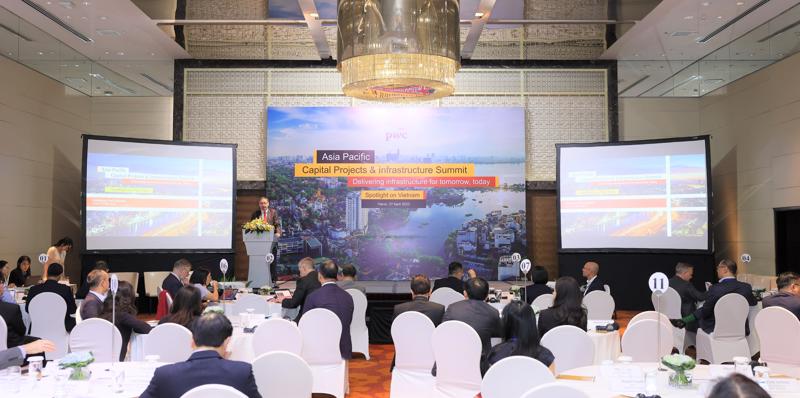The Asia Pacific Capital Projects & Infrastructure Summit, with the theme “Delivering infrastructure for tomorrow, today”, was held by PwC Vietnam on April 27 in Hanoi.
According to PwC’s latest research on green infrastructure, Asia-Pacific’s middle to low-income nations, including India, Indonesia, the Philippines, Thailand, and Vietnam, are where 60 per cent of new infrastructure investment is needed the most, for green transition purposes. However, these countries lack the capacity to fund the necessary green transition, which highlights the need for FDI and support from foreign grants. Meanwhile, developed nations are failing to meet a longstanding pledge to deliver $100 billion to help poorer countries cope with climate change by 2020, as reported by the OECD.
On a positive note, investor interest in sustainable investments is rising, with environment, social, governance (ESG) considerations becoming increasingly important in investment analysis and decision-making, as per PwC’s Global Investor Survey. Furthermore, partnerships backed by government or international finance are emerging, providing financial institutions with assurances to align their investment portfolios towards meeting the goal of limiting global warming to 1.5 degrees as agreed during the Intergovernmental Panel on Climate Change in late 2018.
Vietnam’s commitment at COP26 to reaching net-zero emissions by 2050 has significantly boosted investor interest in sustainable infrastructure investments, with a surge in investments in renewable energy, green buildings, and other sustainable infrastructure projects.
To tap into this financing pool, governments must prioritize green elements and promote infrastructure projects that support a fair and inclusive transition to low-emission economies, while accelerating climate-resilient growth. It is also crucial to develop capacity and upskilling in renewable energy.
The involvement of the private sector is important in achieving sustainable infrastructure, especially in areas with limited public resources. With their financial resources, technical expertise and efficiency, private sector entities can help bridge the infrastructure gap and support the transition towards sustainable development.
The Asia Pacific Capital Projects & Infrastructure Summit served as a platform for global and regional infrastructure leaders and key stakeholders in Vietnam’s infrastructure industry, including financial institutions and the public and private sector, to discuss effective delivery and innovative policy solutions for sustainable infrastructure. The summit showcased the latest innovations and best practices in infrastructure development, taking into account smart technologies, energy transition, and social inclusion.
Vietnam is the leading country in Asia in infrastructure investment, currently spending 5.7 per cent of its GDP on infrastructure. The country is undergoing a major transition towards becoming a high-income economy, and infrastructure development plays a key role in achieving this target. Vietnam is investing heavily in infrastructure to support economic growth, improve the lives of its citizens, support energy transition, and increase its resilience to climate change and natural disasters.
Mr. Dang Huy Dong, President of the Planning & Development Institute and former Deputy Minister of Planning and Investment, said the country’s National Master Plan for 2021-2030 with a vision to 2050 emphasizes the need for an efficient and sustainable spatial organization model for national development, supported by modern and interconnected infrastructure.
The government has also implemented several policies and initiatives to support sustainable infrastructure development, such as investing in renewable energy sources, encouraging the adoption of green building practices, and promoting e-mobility. “We are delighted to see that this summit has brought together cooperative efforts from the public and private sectors and investors towards the shared purpose of sustainable infrastructure development,” Mr. Dong said.
The summit also discussed the challenges facing investors and public agencies in infrastructure investment in Vietnam, including the lack of clear and accurate visibility of demand for infrastructure, poor coordination across multiple actors during the project lifecycle, limited public funding capability, a complex legal and institutional landscape, and capital and time sensitivity.
Tackling these challenges requires long-term planning, clear project pipelines, and integration of local strategic and regulatory frameworks with national policies to attract private investors and developers. Sub-national governments may lack the capacity, experience, and financial resources for high-quality infrastructure project preparation, so assistance from national governments and international institutions is needed. Allocating project risks between private and public sectors is also important, with examples including the government absorbing demand risk for new toll roads in underdeveloped areas, to make such projects more viable for private investment.
According to Mr. Edward Clayton, Partner, Capital Projects and Infrastructure Leader, at PwC Vietnam, developing the infrastructure required for sustainable growth in Vietnam is a complex challenge but one that presents significant opportunities for stakeholders and investors. “We believe that by prioritizing green, sustainable, and inclusive infrastructure projects, we can help accelerate the country’s transition to a high-income, low-emission economy and contribute to creating a sustainable future for the people of Vietnam,” he said.









 Google translate
Google translate